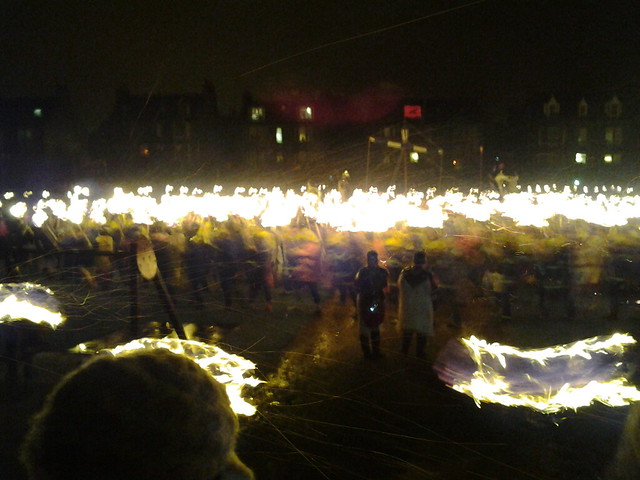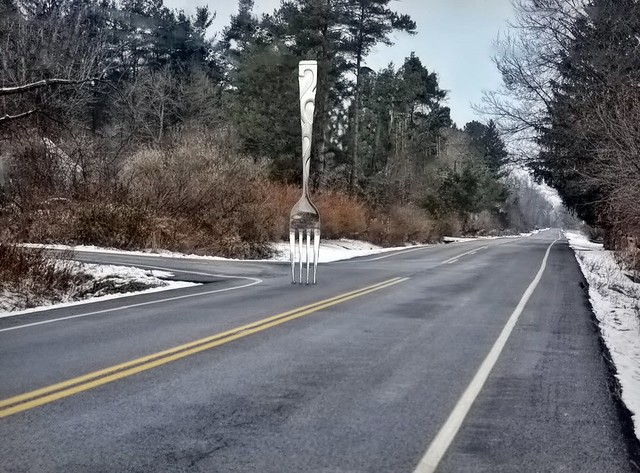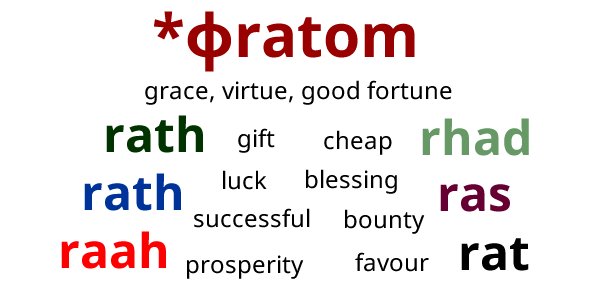Words for heat, warmth and related things in Celtic languages.

Words marked with a * are reconstructions.
| Proto-Celtic |
*texstus = heat |
| Old Irish (Goídelc) |
tess = heat, warmth |
| Middle Irish (Gaoidhealg) |
tess, tes = heat, warmth, sultriness, fervour, zeal
aintes = excessive heat
tesbach, teasbhach = heat, warmth, sultriness, ardour, fury, illess, fever
tessach = feverish heat, fever
tessaide = hot, warm, sultry
tessaigid = to warm, heat |
| Irish (Gaeilge) |
teas [tʲasˠ/tʲæsˠ] = heat, hotness, warmth; warm clothing, warm place; degree of hotness; high temperature, feverishness; ardour, passion; hottest, highest, stage
teasach = feverish heat, fever
teasaí = hot, warm; ardent, passionate; hot feverish; hot-tempered, fiery
teasaíocht = heat, warmth; ardour, passion; feverishness; hot temper, fire
teasaire = heater |
| Scottish Gaelic (Gàidhlig) |
teas [tʲes] = heat, hotness; temperature; heating (in metallurgy)
teas-mheidh = thermometer
teasach = fever, restlessness (caused by heat), mo(u)lt; thermal
teasadair / teasraiche / teasachan = heater |
| Manx (Gaelg) |
çhiass = heat, warmth
çhiassveih = thermometer
çhiasseyder = radiator, heater, warmer
çhiassid = hotness, temperature
çhiassagh = febrile, feverish |
| Proto-Brythonic |
tes = heat, warmth |
| Middle Welsh (Kymraec) |
tes = heat, warmth |
| Welsh (Cymraeg) |
tes [teːs] = heat (of the sun), warmth, (period of) warm weather, sunshine, (heat) haze, mist
cynes [ˈkənɛs] = warm (from cyn (co-) and tes)
tesaint = passion, zeal; heat, warmth
teser = (heat) haze
tesiad = a warming
tesio, tesiaf = to shine (of the sun)
tesog = hot, sunny, close sultry |
| Old Cornish |
tes = heat |
| Middle Cornish (Cernewec) |
tes = heat, warmth |
| Cornish (Kernewek) |
tes = heat
tesa = to heat
tesek = hot
tesel = thermal |
| Old Breton |
tes = heat |
| Middle Breton (Brezhonec) |
tez, tès = heat |
| Breton (Brezhoneg) |
tes = heat |
Etymology: from the Proto-Indo-European *tep- (to be warm, to be hot) [source]. Celtic words from fire come from the same PIE root via the Proto-Celtic *teɸnets (fire) [source]
The English word tepid comes from the same PIE root [source].
| Proto-Celtic |
*teɸents = heat |
| Old Irish (Goídelc) |
té, tee [tʲeː] = hot, warm; lustful, wanton; comfortable, sheltered; fervent; fierce, keen |
| Middle Irish (Gaoidhealg) |
té, te = warm, hot, comfortable, sheltered, fervent, fierce, keen, bold |
| Irish (Gaeilge) |
te [tʲɛ] = hot, warm; pungent; ardent, hot-tempered, vehement, hotfoot; affectionate, comfortable
teobhlasta = hot (spicy)
teochroí = warm-heartedness, warmth, affection
teochroíoch = warm-hearted
teocht = warmth, heat, temperature
teofholach = warm-blooded
alathe = lukewarm
téamh = heating, warming, distillation |
| Scottish Gaelic (Gàidhlig) |
teth [tʲeh] = hot
ain-teth = scorching, exceedingly hot, ardent, vehement, eager, inflamed |
| Manx (Gaelg) |
çheh = fevered, fervent, heated, hot, impassioned, passion, sexually precocious, thermal, warm
çhiow = to warm up, warm, warming up, inclined, yearned, heat,warmed |
Etymology from the Proto-Indo-European *tep- (to be warm) [source].
| Proto-Celtic |
*gʷrensos, *gʷrīnnso- = heat |
| Old Irish (Goídelc) |
grís = heat (of the sun), fire, embers |
| Middle Irish (Goídelc) |
grís, gríss = heat, fire, embers, hot ashes; glow, ardour, valour, passion |
| Irish (Gaeilge) |
gríos [ɡɾʲɪsˠ] = hot ashes, embers; heat, glow, ardour; rash, blotches (on skin)
gríosach = glowing
gríosóg = spark from embers, inflamed spot, rash
gríosóir = inciter, agitator
gríostaitneamh = burning, rosy, glow
gríosú = inflammation, incitement, stimulation |
| Scottish Gaelic (Gàidhlig) |
grìos [grʲiːs] = begging, entreaty; heat, embers, redness, inflammation, provocation
grìosad [grʲiəsəd] = begging, beseeching, entreating, cursing, swearing, stirring up a fire, provoking |
| Manx (Gaelg) |
gree [ɡriː] = heat
greeshagh = arouse (passions), arousing, vibrant, ember
greeshaghey = to aggravate, chivvy, set on, whip up, arouse (passions) |
| Middle Welsh (Kymraec) |
gwres, ywres, gỼres = heat, warmth
guressaei = to heat, warm
guressauc, gwressawc = hot, very warm
gwresoca, gwresogi = to make warm or hot |
| Welsh (Cymraeg) |
gwres [ɡwreːs] = heat, warmth, hot weather, feverishness, itching; intensity (of feeling), passion, lust, vehemence, ardour, fervour, zeal, enthusiasm
gwresâf, gwresáu = to heat, warm
gwresio, gwresu = to become heated, heat, generate heat, emit warmth
gwresog = hot, very warm, summery, heat-giving, calorific
gwresogi = to make warm or hot, provide warmth, heat |
| Middle Cornish (Cernewec) |
gwres = heat |
| Middle Breton (Brezhonec) |
groès, groës = heat |
| Breton (Brezhoneg) |
gwrez = heat, temperature, ardent, fervent, blazing
gwrezus = calorific
gwrezverk = temperature |
Etymology possibly from the Proto-Indo-European *gʷʰer- (warm, hot) [source]. English words from the same PIE root include furnace, gore, thermal and warm [source].
| Proto-Celtic |
*teɸesmis/*tefesmi- = heat |
| Middle Welsh (Kymraec) |
tui, tvymyn, tỼym, twym [tuːɨ̯m/tʊi̯m] = warm, (quite) hot, infectious, fervent, intense, passionate, heated, unpleasant, dangerous, heat, fever
twymna, tỼymaỼ, twymo = to make/become warm or hot
twymder = warmness, warmth, hotness, heat
twymyn = fever |
| Welsh (Cymraeg) |
twym [tuːɨ̯m/tʊi̯m] = warm, (quite) hot, infectious, fervent, intense, passionate, heated, unpleasant, dangerous, heat, fever
twym(n)af, twym(n)o = to make/become warm or hot, to warm, to heat, to ferment
twymder = warmness, warmth, hotness, heat
twym(n)wr, twymydd = person or thing that warms, heater
twymyn = fever, warm drink |
| Old Cornish |
toim, tum = hot, warm, heated |
| Middle Cornish (Cernewec) |
tom = hot, warm
tomder = heat, warmth
tomma = to make warm, to warm
tubm = hot, burning
tubma = to make hot, to heat, to warm |
| Cornish (Kernewek) |
tomm, tobm = hot, warm
tomm y wos, tobm y woos = hot-blooded
tomma, tobma = to warm, become warm
tommhe, tobmhe = heat, warm
tommheans, tobmheans = heating
tommheans ollvysel, tobmheans ollvesel = global warming |
| Middle Breton (Brezonec) |
tomm, toem, tuem = hot, warm, heat
toemaff, tomaff = to heat, to warm up
toemder, tomder = heat |
| Breton (Brezhoneg) |
tomm [tɔmː] = hot, warm
tommañ = to heat, to warm up, to be fond of, to become attached to
tommder = heat
tommerez = stove
tommerezh = boiler room |
Etymology: from the Proto-Indo-European *tep- (to be warm, to be hot) [source]. Words for fire in Celtic languages come from the same root.
| Proto-Celtic |
*brutus = fermentation, boiling heat |
| Old Irish (Goídelc) |
bruth [bruθ] = boiling, fury, glow, heat, rage, vehemence |
| Middle Irish (Goídelc) |
bruth = (boiling) heat, blaze, glow, anger, fury, excitement, fervour, valour
bruthach = fiery, furious, vigorous
bruthmar = fiery, raging, furious, ardent |
| Irish (Gaeilge) |
bruth [bˠɾˠʊ(h)] = heat, rash, eruption, nap, pile, covering, surf
bruthach = hot, fiery, napped, fluffy
bruthaire = cooker
bruthán = (slight) rash
brufar = ardent, fiery, lively |
| Scottish Gaelic (Gàidhlig) |
bruth [bruhθ] = hotness (of skin), hot and confined space, red-hot object, heat, fire
bruthainn [bruhɪn̪ʲ] = sultriness, sultry heat
bruthairneach [bruhər̪n̪ʲəx] = muggy, sultry, sweltry
bruich = to cook, boil |
| Manx (Gaelg) |
brooan = rash, eruption, skin disorder |
| Old Welsh |
brut = hot, warm |
| Middle Welsh (Kymraec) |
brytt, brwt, brwd = hot, warm, heat
brytio = to heat, warm, boil |
| Welsh (Cymraeg) |
brwd [bruːd] = hot, warm. heated, ardent, boiled, fervent, zealous, heat, brew(ing),
brwdfrydu = to enthuse, speak or feel with fervour
brwdfrydedd = zeal, enthusiasm, fervour, fanaticism
brwdfrydig = zealous, enthusiastic, fervent, ardent
brwdias = hot, heated, fiery, parboiling
brydio = to heat, warm, boil |
| Old Cornish |
bredion = to boil |
| Middle Cornish (Cernewec) |
bredion, bridzhen = to boil |
| Cornish (Kernewek) |
bryjyon = to boil
bryjys = boiled |
| Old Breton |
brot = ember |
| Middle Breton (Brezonec) |
broud = ember, excitement |
| Breton (Brezhoneg) |
broud [bruːt] = ember, excitement
broudañ [bruˈdɑːdɛn] = to burn, scald
broudus [ˈbruːdys] = stimulant |
Etymology: from the Proto-Indo-European *bʰrewh₁- (to boil, brew), from *bʰer- (to boil) [source]. Words for the same roots include bread, brew, broth, burn and fervor in English [source].
| Proto-Celtic |
*kʷoxtos = cooked, hot |
| Proto-Brythonic |
*poɨθ [ˈpoɨ̯θ] = cooked, hot |
| Middle Welsh (Kymraec) |
poeth = hot, burning
poethi = to heat, warm, burn, scorch, roast |
| Welsh (Cymraeg) |
poeth [poːɨ̯θ/pɔi̯θ] = hot, burning, fervent, intense, lustful, roast, cooked
poethaf, poethi = to heat, warm, burn, scorch, roast
poethder = heat, hotness, burning, inflammation, ardour, zeal, fervour
poethineb = passion, ardour, zeal, hot-headedness |
| Middle Cornish (Cernewec) |
poth = hot |
| Cornish (Kernewek) |
pooth = hot, scorching
potha = to heat, scorch |
| Middle Breton (Brezonec) |
poaz = cooked, grilled, burning
poazat, poazet = to cook, bake |
| Breton (Brezhoneg) |
poazh [bruːt] = cooked, burned, burning
poazhadur = cooking, baking, roasting
poazhañ = cooking, baking, roasting
poazhat = cooked
poazherez = cooker |
Etymology: from the Proto-Indo-European *pokʷ-tó-s from *pekʷ- (to cook, ripen) [source]. Words for the same roots include apricot, biscuit, cook, cuisine and kitchen in English [source].
Words marked with a * are reconstructions.
Sources: Wiktionary, Am Faclair Beag, Online Manx Dictionary, Teanglann.ie, eDIL – Electronic Dictionary of the Irish Language, In Dúil Bélrai English – Old Irish glossary, Geiriadur Prifysgol Cymru, Gerlyver Kernewek, Lexicon Cornu-britannicum: A Dictionary of the Ancient Celtic Language of Cornwall, Dictionaire Favereau, TermOfis, Le dictionnaire diachronique du breton, Etymological Dictionary Of Proto Celtic












